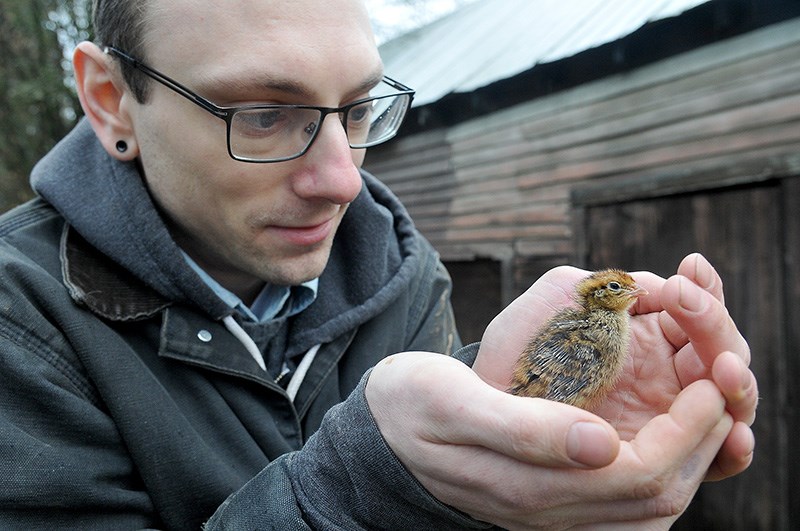Ben Glassen is hoping to change the way people think about their food and sustainable agriculture — one quail at a time.
The Port Moody resident envisions friends and neighbours in his historic Moody Centre neighbourhood turning over a small part of their backyards to raise the tiny birds for their eggs and meat.
Here's his plan: Glassen would move his small, portable coops around the yards every day, and from yard to yard every week or so, caring for the birds himself by providing them with food and water. The homeowners would benefit from the natural pest control as the quail hunt and peck for grubs and insects while fertilizing the grass with their droppings, and they would have ready access to a supply of eggs as well as, when the males mature after two months, meat.
(A typical female quail lives two years, laying an egg almost every day. Males would be humanely slaughtered by a butcher for meat when they mature after two months.)
Glassen, who studied sustainable food systems at Capilano University, is test-running his idea with a property owner in Maple Ridge. But he’ll have to confirm how it fits into Port Moody’s animal control and zoning bylaws before he can bring it home to roost in his own neighbourhood.
The city’s bylaw for permitted uses of residential properties allows “the keeping of animals as household pets when such animals are normally kept within a dwelling unit."
Glassen said the quail’s small size, quiet demeanour, low-cost care and maintenance, and short lifespan make them ideal for small-scale urban farming, avoiding many of the problems that can come with backyard chicken coops.
The city of Vancouver allows a maximum of four registered hens in a backyard coop and other fowl, like ducks or turkeys, are prohibited. In Coquitlam, chickens can only be raised on a property zoned for farming.
Glassen said his early overtures to neighbours, and a presentation he gave at a recent Tri-City Greendrinks open-mic event at the Gallery Bistro have yielded positive feedback.
“It’s very much about creating greater awareness about sustainable, high-quality food and how available it can be,” Glassen said. “There’s no more secure, sustainable place than to just look into your backyard.”
And in a way, Glassen said, raising quail would bring Port Moody back to its historic roots, when pioneers settling the city had to team with their neighbours to grow their own food and share the responsibility of keeping crops sustainable.
“It totally fits to be going back to our old practices to supplement our diet,” Glassen said.
• For more information about raising quail or being part of a backyard farm cooperative to raise the birds, email Ben at ben.glassen@gmail.com.



